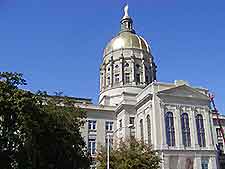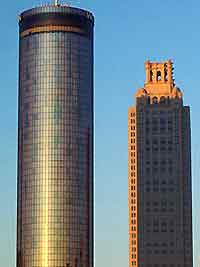Atlanta History Facts and Timeline
(Atlanta, Georgia - GA, USA)

A Native American site named Standing Peachtree is the place where Georgia's most populated city, Atlanta, stands today.
Standing Peachtree, as the traditional boundary between the Cherokee and Creek territory, was a frequent meeting place for the two tribes. The Chattahoochee River and Peachtree Creek also meet near Standing Peachtree.
American Forts in the Atlanta Area
After the British recruited the Creeks to burn southwest Alabama's Fort Mims during the War of 1812, the Americans established a series of forts along the Chattahoochee and Ocmulgee rivers. A road was constructed along ancient native trails between Fort Gilmer - established next to Standing Peachtree, and Fort Daniel - situated at Hog Mountain's summit, close to the modern community of Dacula.
Railroad Junction History
The corner of Atlanta's present day International Boulevard and Courtland Avenue was the location of the first cabin, which was built by the city's first permanent resident during the early 1830s. The settlement was initially named Terminus in 1837, because it was chosen as the ending point of a rail line linking the community with
Chattanooga, Tennessee.
The municipality was briefly called Marthasville after the governor's daughter in 1843, but the history of Atlanta began under its present name in 1845. Atlanta became an officially incorporated city in 1847 and its original rail terminus is now the vibrant Five Points district. Three rail lines passed through the city by 1847 and the community's population increased dramatically from just 30 people in 1842, to over 6,000 residents by 1855.
The American Civil War
As a significant rail junction and military supply center, Atlanta became a major Union target during the American Civil War (1861 to 1865). In 1864, Union General William T. Sherman mounted a four-month long siege, which resulted in a forced evacuation of the city's civilian population before the city was burned to the ground. Only local hospitals and churches remained standing. The city's fall was an important turning point in the war and Atlanta's history.
After the Civil War, Atlanta adopted the phoenix as its symbol, to represent how the city successfully rebuilt itself from ashes. The city experienced another dramatic population increase during the post Civil War reconstruction era, when freed slaves and impoverished farmers arrived in droves.
Coca-Cola Company
In 1886, Jacob's Pharmacy sold the world's first Coca-Cola bottles as headache tonics, and the Coca-Cola Company was officially founded five years later. By 1919, the Coca-Cola Company was worth millions and it is now among the city's top tourist attractions, with regular guided tours offered.

More Fires / Gone With the Wind
In 1917, Atlanta's history once again involved rebuilding itself after a fire destroyed almost 2,000 buildings and left 10,000 people without homes. Yet another 119 people perished in the worst hotel fire in United States history at the Winecoff Hotel.
During the 1930s, Civil War-era Atlanta and the rest of Georgia became immortalized in Margaret Mitchell's only novel, the Pulitzer Prize-winning Gone With the Wind. Atlanta hosted the world premiere of the equally classic 1939 film based on the novel, which won several Academy Awards.
Tragedy and Triumph
Further tragedy struck after 106 members of the city's art association were killed in a 1962
Paris plane crash, while Martin Luther King, Jr. was buried in the city following his 1968
Memphis assassination. Only five years after King's death, however, the city elected its first African American mayor, Maynard Jackson. In 2001, Atlanta once again made history when Shirley Franklin became the city's new mayor. Franklin was the first African American female mayor of any city in southeast United States.
In recent decades, Atlanta has blossomed into one of the fastest growing United States cities and has become home to Ted Turner's Cable News Network (CNN) and the Turner Broadcasting System channels. Although the city's 1996 Summer Olympics hosting stint was marred by a tragic pipe bomb explosion, the city once again rebounded to host the 2000 American football Super Bowl.
After the recent Georgia Aquarium, Centennial Olympic Games Museum and World of Coca-Cola theme park openings, Atlanta has become America's seventh-most visited city, greeting more than 35 million tourists each year.
 A Native American site named Standing Peachtree is the place where Georgia's most populated city, Atlanta, stands today.
A Native American site named Standing Peachtree is the place where Georgia's most populated city, Atlanta, stands today.